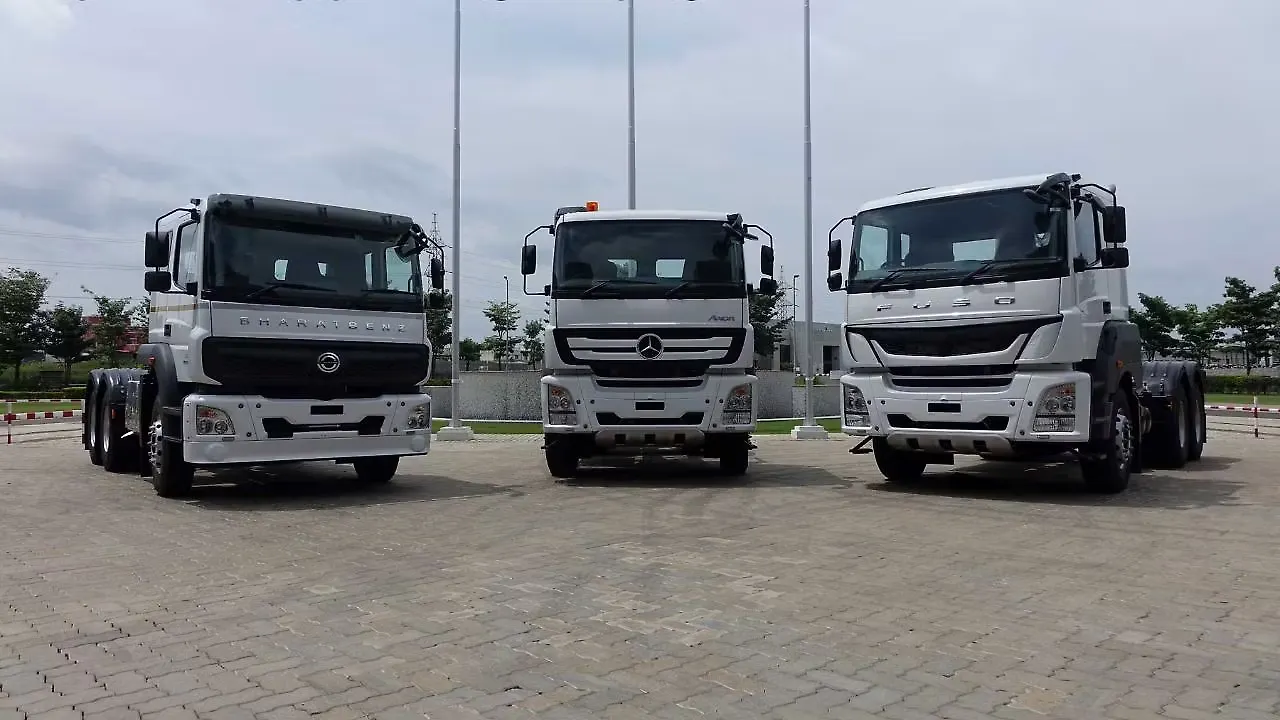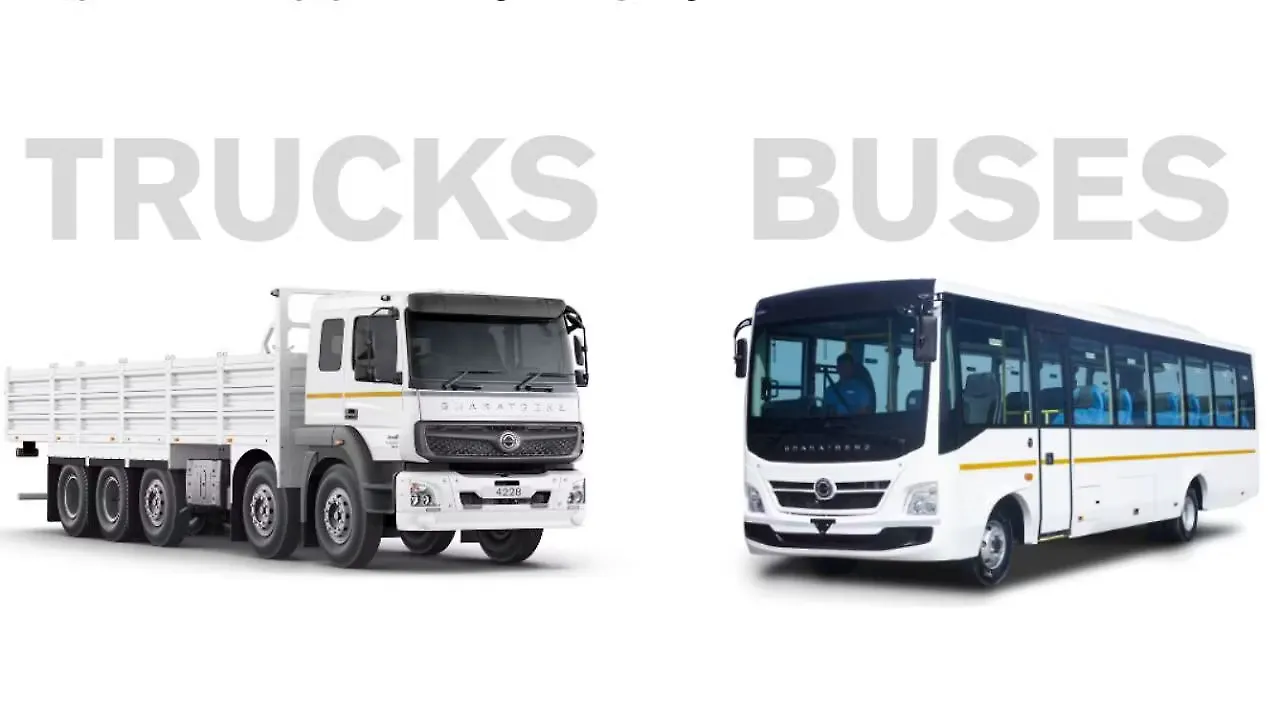
The excitement in Satyakam Arya’s eyes is more than apparent when he talks of the Daimler Truck roadmap for India during a recent breakfast meeting in Mumbai.
“India is one of the fastest growing markets right now for commercial vehicles,” says the Managing Director and CEO of Daimler India Commercial Vehicles (DICV). The first half of this calendar saw the Chennai-based company outperforming the market in medium and heavy-duty trucks as well as buses.
According to Arya, the OBD 2 (onboard diagnostics to handle the transition to Bharat Stage 2 emission norms which came into effect from April 1) portfolio of BharatBenz — the brand for its India range — has been “well accepted” in the market. This is thanks in large part to an improvement in the total cost of ownership which is crucial to fleet operators. With higher horsepower now in place, this has translated into better turnaround time, with maintenance costs also down by 11-15%.
A long-haul BharatBenz truck, with six years of operations on Indian roads, now needs to visit the workshop barely five times which is music to the ears of its users. Truck operators abhor breakdowns because the time lost can be a big setback to their business.
Arya believes that sales of medium and heavy commercial vehicles, the bread-and-butter of the DICV business, will touch a figure of 330,000 units this calendar, a marginal growth of 6-7% from last year’s levels. The following year will see the national elections happening, and industry experts believe that growth will pick up in the latter half once there is a Government in place at the Centre.
Bright Future
“The best years are ahead in the mid to long-term and 2030 will be close to 450,000 medium and heavy duty trucks,” says Arya. Tonnage will also increase a lot faster with the market moving to multi-axle trucks. His optimism is also shared by the German parent which, in its Capital Market Day presentation to investors last month, projected 70% growth for India which was substantially higher than other key markets like North America, Europe and Brazil.

Additionally, Daimler Truck has estimated a 14% market share for India in 2030 which will be a huge jump from the single-digit levels presently. The company has indicated that it will continue to focus on premium offerings with safety, reliability and efficiency as its calling card while leveraging products made in India for export into emerging markets. Daimler Truck recently entered into an alliance with Toyota where, more specifically, the truck arms of each company — Mitsubishi Fuso and Hino Motors — will endeavour to create a trucking powerhouse in Asia.
For now, it is too early to predict the impact of this partnership in India, but it would be logical to assume that the buildup of scale could pave the way for huge sourcing opportunities. To that extent, suppliers of DICV may be in for some robust business opportunities during the course of this decade, while a Hino entry into this part of the world may be a distinct possibility too.
Arya clearly believes that the sky’s the limit for DICV as it goes about creating vital building blocks for the future. He refers to the recent notification by the Centre on air-conditioned truck cabins becoming mandatory by 2025 which would be a cakewalk for DICV since 65% of its fleet already has this requirement in place.
“We have never compromised on safety either,” he adds, given that the company’s range is now on a par with the latest norms in Europe even though there is no regulation mandating this. “We do not believe in driving our business with market share alone,” reiterates the DICV chief while driving home the point that it is equally important to be a responsible stakeholder.
Sustainability Vision
When it comes to sustainability, the company is aiming for 100% carbon neutrality by 2025 from its present level of 85%. It is also aiming to be self-reliant on water by this time. “All this is good for overall sustainability, savings on costs and productivity,” says Arya and even though it is a relatively smaller entity in the Daimler Truck fold, DICV is clearly among the frontrunners in this space. Digitalisation is also growing at a rapid pace and there is “phenomenal activity” going on right now.
“India offers certain strengths like frugality and delivering the best value which extends beyond commercial vehicles alone. At DICV, we have shown this trait since the time we began business years ago in terms of rapid localisation and delivering world-class products without compromising on quality,” says Arya. Additionally, Daimler Truck Innovation Centre in Bengaluru is doing a lot of work on cutting edge technology in digitalisation and powertrain “thanks to capable engineers eager to learn quickly”.
The DICV chief is keen on enhancing competencies in key functions such as R&D, IT and cybersecurity which could also be tapped by Daimler globally in the future. The Global Capability Centre in Chennai has over 200 people in key functions and this pool will also be increased in the coming years. While there are areas with abundant talent in place, Arya is aware that the reverse also holds true especially when it comes to a crying need for more data scientists or getting the right talent in place for connected vehicles or artificial intelligence.
He is, however, confident that all this can be ironed out in the next few years while additional skills can also be identified for hydrogen and electric powertrains which will be Daimler Truck’s fuel navigators of the future. “We are working with universities to define curricula for students. Courses are also being offered to our employees who either study part time or go back to university,” says Arya.
Banking On Startups
DICV also has a digital learning platform operational at its Chennai premises where its workforce is learning all the tools and how they can be applied appropriately. The company, it may be recalled, established an incubator at IIT Madras last year which is “one of the most vibrant startups in the country” focusing on mobility-related technology and Industry 40.
Right now, there are seven startup companies in place with “great ideas going in from youngsters who are passionate and energetic”. According to him, Chennai as a manufacturing hub offers a lot of entrepreneurship capabilities. DICV had sponsored the Avishkar Hyperloop team of IIT Madras last year as it found the concept interesting as also “the technical skills and passion' displayed by the students.
“Whenever disruption happens, we need to learn to deal with it, especially in technology. We have to think about its impact on society and create a framework for suitable adoption,” says Arya while referring to the past when technology posed threats of job losses but nothing of the kind happened as people quickly adapted to the new skills required. “We have to give time for this shift to happen and that would be a responsible way to do it,” he adds.
As for new energy options, the challenges lie in a mix of technology, infrastructure and the right cost equation since none of them can work in isolation. These three criteria, continues Arya, also hold good for commercial vehicles where, with tech and infrastructure in place, the cost equations get settled and mature.

Energy Tracks
Battery and hydrogen are the two tracks identified by Daimler. As he explains, there are intracity applications like light pickups and buses which perhaps do around 200 km daily while long haul applications can go up to 1,000 km. “With batteries, up to 500 km on a single charge is doable and beyond that the weight of the battery compromises on the payload. It has to make business sense else the cost equation is lost,” says Arya.
Intracity applications for trucks and buses can ideally opt for battery electric while hydrogen is the best bet for intercity uses. Daimler Truck has a joint venture with Volvo in Europe for fuel cells with trials now happening on battery electric and hydrogen.
“On fuel cells, we believe the second half of this decade will be the right time globally and are closely watching the space here. We have to ensure that supplies are in place before getting the products to India,” he says. Partnerships will also play a big role going forward as new technologies enter the market.
Daimler Truck has already made known that when it comes to zero emissions, battery electric and hydrogen are ideal since natural gas is a transitional fuel which poses challenges to the powertrain in terms of temperature, productivity, engine power etc. From the company’s point of view, it is an alternative to diesel but does not bring the desired value equation to the customer.
“We understand the energy needs of India for reducing emissions but gas is definitely not sustainable for us. If there are some specific applications for segments, we will go in for a tactical step forward but not a permanent solution,” says Arya.
Trucks and buses do run on diesel today and natural gas has made a few inroads but in the future, there will be “more powertrain complexities” in the fuel system which will challenge dealers, mechanics, customers and manufacturers. “We need to think carefully before making choices…short term benefits are fine but not the answer,” signs off the DICV chief.
Also Read:
With ‘BharatBenz Certified’, DICV Enters Pre-owned CV Business
Why DICV & IITM Incubation Cell Have Chosen To Nurture Start-ups